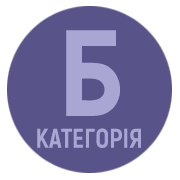PREPARATION OF FUTURE TEACHERS FOR THE FORMATION OF THE CULTURE OF WORKING WITH THE TEXT OF AN ESSAY IN THE STUDENTS OF NUSH
DOI:
https://doi.org/10.32782/philspu/2024.6.11Keywords:
linguistic and methodical preparation, formation, future teacher of Ukrainian language and literature, culture of working with the text of an essay, content and methodical support, teaching Ukrainian language in the seventh grade of NUShAbstract
The article outlines the methodological and content-methodical support for the preparation of future teachers of the Ukrainian language and literature for the formation of a culture of work in students of the 7th grade of NUSh with the text of an essay. Based on the analysis of educational documents, scientific sources, and research work, it was found that the concept of «culture of working with the text of essays of NUSh students» includes the following components: culture of reading, culture of compositional construction, linguistic and stylistic culture. For writing a free and formal essay, the culture of reading journalistic, artistic, media texts, information selection, and its analysis is important. The formation of the culture of working with the text of the essay of the students of NUSh is outlined as a competence-oriented process that depends on individual experience, background knowledge, creative thinking and is aimed at the formation of motivation, language and speech knowledge, abilities and skills. The research methodology involves taking into account the main provisions of personally oriented, competence, activity and communicative-genre approaches. In the context of the formation of the work culture of students of the 7th pilot class of NUSh with the essay text, a model program is outlined (authors – N. Golub, O. Horoshkina) and separate textbooks, in which text activity and essay writing are given a prominent place, offer thoughtful reading and critical understanding of texts on cultural topics; definition and formulation of the problem of the text; editing, additions, reformatting of the text. Some aspects of the experience of the teacher of the pilot 7th grade of NUSh regarding the formation of the culture of students' work with the text of the essay were analyzed, and assumptions were made regarding the importance of individual experience, emotional component, background knowledge, and creative thinking. Taking into account research work, personal and competence approaches, exercises for reading and understanding the text, reasoning, applying knowledge in a specific situation have been developed within the framework of the Ukrainian language teaching methodology course. It is noted that the Google Arts & Culture service, as well as national projects, are effective methods and tools that activate the teacher's preparation for the integration of essays in the teaching of the Ukrainian language.
References
PISA 2022 Results: Ukrainian Regions (18 of 27). URL: https://www.oecd.org/publication/pisa-2022-results/country-notes/ukrainian-regions-18-of-27-78043794/ (дата звернення: 16.04.2024).
Пасько І. Що означає бути компетентним читачем – міжнародний досвід (бонус до аналізу програм з української мови та літератури). URL: https://nus.org.ua/articles/shho-oznachaye-buty-kompetentnym-chytachemmizhnarodnyj-dosvid-bonus-do-analizu-program-z-ukrayinskoyi-movy-ta-literatury/ (дата звернення: 12.05.2024).
Струк О. PISA-2022. Найнижчі результати українські учні показали в читанні, найвищі – в природничо-наукових дисциплінах. URL: https://lb.ua/society/2023/12/05/587551_pisa2022_naynizhchi_rezultati.html (дата звернення: 18.04.2024).
Загальнодержавне моніторингове дослідження якості освіти у закладах загальної середньої освіти в умовах воєнного стану: звіт за результатами моніторингу. (2023). Державна служба якості освіти України. URL: https://sqe.gov.ua/wp-content/uploads/2023/09/Zagalnoderzhavne-monitoringove-doslidzhennya-yakosti-osviti-u-ZZSOv-umovakh-viyni-2023_SQE-SURGe.pdf (дата звернення: 16.02.2024).
Голуб Н.Б., Горошкіна О. Українська мова. 7–9 класи. Модельна навчальна програма. URL: https://mon.gov.ua/storage/app/media/zagalna%20serednya/Navchalni.prohramy/2023/Model.navch.prohr.5-9.klas/Movno-literat.osv.hal/Ukrayinska.mova.7-9%20klas.Holub.ta.in.26.07.2023.pdf. (дата звернення: 06.02.2024).
Українська мова. 7-9 класи. Модельна навчальна програма / О.В. Заболотний та ін. URL: https://mon.gov.ua/storage/app/media/zagalna%20serednya/Navchalni.prohramy/2023/Model.navch.prohr.5-9.klas/Movno-literat.osv.hal/Ukrayinska.mova.7-9.klas.Zabolotnyy.ta.in.02.08.2023.pdf (дата звернення: 23.05.2024).
Семеног О., Дятленко Т., Калинич О. Підготовка майбутніх учителів української мови і літератури до навчання учнів у НУШ. Слобожанський науковий вісник. Серія «Філологія». 2023. Вип. 4. С. 90–97. DOI: https://doi.org/10.32782/philspu/2023.4.18 (дата звернення: 11.04.2024).
Семеног О., Плужник Ю. Фахово-методична підготовка майбутніх учителів до формування читацької грамотності учнів на засадах дослідження PISA-2018. Слобожанський науковий вісник. Серія «Філологія». 2023. Вип. 3. С. 150–162. DOI: https://doi.org/10.32782/philspu/2023.3.27 (дата звернення: 16.04.2024).
Семеног О., Ольховик М. Формування культури роботи майбутніх учителів української мови і літератури з Інтернет-текстом. Слобожанський науковий вісник. Серія «Філологія». 2024. Вип. 5. С. 54–61. DOI: https://doi.org/10.32782/philspu/2024.5.10 (дата звернення: 20.06.2024).
Михайлин І. Основи журналістики : підручник. Київ : ЦУЛ, 2002. 284 с.
Літературознавчий словник-довідник / ред. Р.Т. Гром'як, Ю.І. Ковалів, В.І. Теремко. Київ : Академія, 2007. 752 с.
Груба Т.Л. Жанр есе у лінгводидактичному вимірі. Психолого-педагогічні основи гуманізації навчально-виховного процесу в школі та ВНЗ. 2014. Вип. 2. С. 45–51.
Глазова О. Есе як вид роботи з розвитку писемного мовлення школярів. URL: https://glazova.org.ua/wp-content/uploads/2017/02/o.glazova_ese_jak_vyd_roboty_z_rozvytku_pysemnogo_movlennia_shkoliariv.pdf (дата звернення: 16.02.2024).
Грона Н.В. Есе як актуальний спосіб комунікації здобувачів освіти: особистісно зорієнтовані соціально-філософські композиційно-мовленнєві аспекти. Матеріали ІІІ Міжнар. наук.-практ. конф. «Актуальні питання сучасної науки», 10 травня 2023 р. URL: https://doi.org/10.30525/978-9934-26-303-3-28 (дата звернення: 16.02.2024).
Методичні рекомендації до 2023–2024 навчального року. Тернопільський ОКІП. URL: https://drive.google.com/file/d/1Z69ioDIMOfccvwO0PAl-7Hm73g0BdxVi/view (дата звернення: 16.02.2024).
Шендеровський К.С. Як написати успішне есе: Методичні рекомендації до написання есе. Київ : Ін-т масової комунікації при КНУ імені Тараса Шевченка, 2007. 34 с.
Бех І.Д. Проблема успішного педагога як вихователя в контексті європейського вибору України. URL: https://enpuir.npu.edu.ua/bitstream/handle/123456789/41110/Aktualni%20problemy%20psykholohii%20rozvytku%20osobystosti.pdf?sequence=1#page=7 (дата звернення: 24.02.2024).
Голуб Н.Б. Ціннісний компонент компетентності у модельній програмі й підручнику української мови. URL: http://surl.li/qiyhv (дата звернення: 16.03.2024).
Українська мова : підручник для 7 класу закладів загальної середньої освіти / О.М. Семеног та ін. Тернопіль : Астон, 2024. URL: https://lib.imzo.gov.ua/konkursniy-vdbr-pdruchnikv-dlya-7-klasu/movno-lteraturna-osvtnyagaluz/ukranska-mova/ukranska-mova-pdruchnik-dlya-7-klasu-zakladv-zagalno-seredno-osvti-avt-semenog-o-m-kalinicho-v-dyatlenko-t--blyasnik-m-d-gapon-l-o/ (дата звернення: 14.05.2024).







